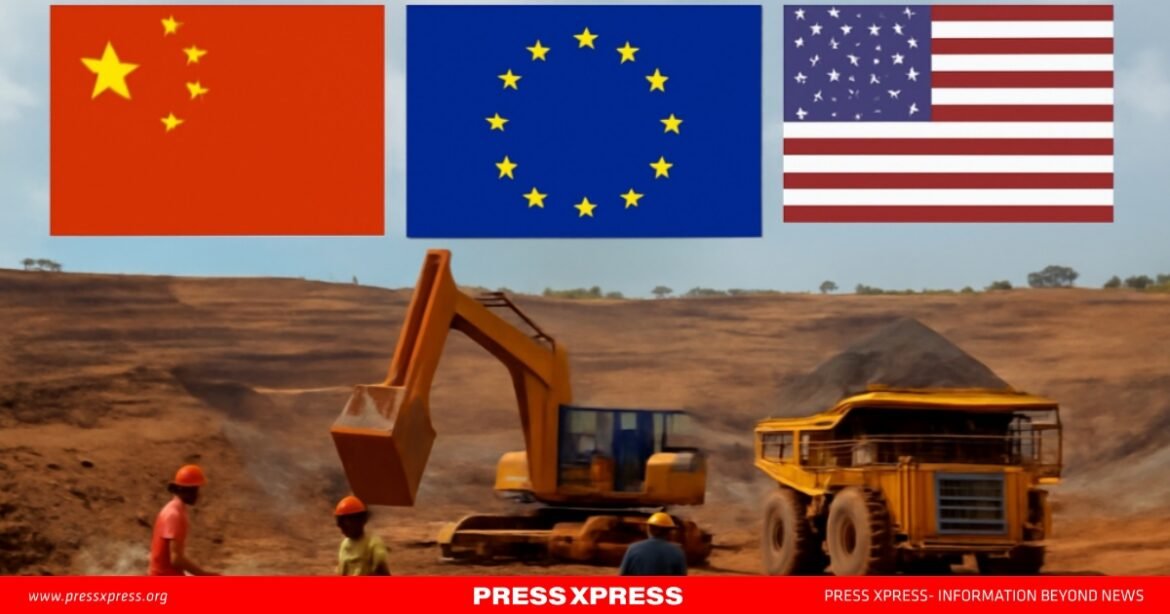Africa’s geopolitical significance is growing, primarily driven by its wealth of resources—cobalt, lithium, and rare earth minerals that are crucial to the global transition to renewable energy. While these resources have the potential to fuel Africa’s economic growth, they have also made the continent a battleground for global powers. China and the West, especially the U.S. and Europe, are increasingly competing for influence, and this rivalry is not just about trade and investment anymore. It’s now directly impacting African elections, raising important questions about sovereignty, political freedom, and long-term development.
Africa’s Resource Wealth: A Global Power Play
Africa is home to over 70% of the world’s cobalt reserves, 30% of its uranium, and a significant portion of its lithium, crucial to electric vehicle batteries and renewable energy technologies. The DRC alone holds around 60% of the world’s cobalt, making it a central figure in the global supply chain for clean energy (US Geological Survey). Additionally, Africa controls 40% of the world’s lithium reserves, and countries like Zimbabwe and Zambia are key players in copper and uranium mining.

With the global transition to clean energy accelerating, these resources have become increasingly vital. China, in particular, has invested heavily in securing access to these materials, leading to a growing Chinese presence in African mining and infrastructure projects. According to the Chinese Ministry of Commerce, Chinese companies have invested over $30 billion in Africa’s mining and energy sectors in recent years, making China Africa’s largest trading partner (China’s Ministry of Commerce).

However, the United States and European nations are also intensifying their engagement with Africa. In 2024, the U.S. announced an investment plan to provide $15 billion in funding to African countries over the next five years to support the development of their critical minerals sector. The EU, recognizing the importance of African resources to its green energy goals, launched the Africa-Europe Green Investment Initiative, pledging to invest €10 billion in the African mining sector by 2027 (European Commission).
Political Influence: The New Face of Geopolitical Rivalry
The struggle for Africa’s resources is increasingly playing out in the political arena. As China and Western countries try to sway African nations to their side, their influence on local elections has become undeniable. Foreign powers are not just investing in infrastructure projects or signing trade deals—they are actively shaping political outcomes to secure their strategic interests.
China’s influence often comes in the form of large infrastructure projects, such as roads, power plants, and railways, which many African governments rely on for economic growth. While these projects are vital to the development of many countries, they also tie African governments to China politically. Leaders who rely on Chinese financing and support often feel obligated to back Beijing’s geopolitical goals in return.
On the other hand, the West has focused more on supporting democratic processes in Africa. The U.S. and European nations have provided funding and diplomatic backing to civil society organizations and opposition parties in an effort to encourage free and fair elections. While these efforts are often framed as promoting democracy, they have led to accusations of meddling in African politics, with critics arguing that Western powers are using democracy as a pretext to advance their own interests.
The Double-Edged Sword of Resource Diplomacy
The increasing role of foreign powers in Africa’s political processes is closely tied to resource diplomacy—the use of Africa’s natural wealth to exert influence. While foreign investment can help drive economic development, it can also create a number of challenges. Many African countries face environmental degradation, poor labor conditions, and corruption in the wake of large-scale mining operations. These issues are often exacerbated by the involvement of foreign companies, both Chinese and Western, that prioritize profits over local communities.
In the DRC, for example, Chinese mining companies have been accused of failing to respect local labor rights, causing environmental harm, and not contributing adequately to the local economy. Similarly, Western companies operating in Africa have been criticized for exploiting the continent’s resources without providing enough economic benefits to the population. This has led to a growing sense of disillusionment among many Africans, who feel that their resources are being siphoned off to benefit foreign powers, leaving them with little to show for it.
Balancing Sovereignty and Development
For Africa to benefit fully from its resource wealth, it needs to strike a balance between attracting foreign investment and maintaining control over its own future. African governments must ensure that their resource extraction deals are transparent, fair, and benefit local populations. This means negotiating better terms with foreign companies, ensuring that profits from resources are reinvested in the community, and holding companies accountable for their environmental and social impacts.
Regional cooperation is also crucial. Through organizations like the African Union (AU), African countries can present a united front when negotiating with foreign powers, ensuring that their collective interests are protected. By working together, African nations can secure better deals and avoid falling prey to the manipulation of outside powers.
At the same time, Africa needs to strengthen its own capacity to manage its resources. This includes building stronger institutions, promoting transparency, and encouraging local businesses and industries. By diversifying economies and reducing reliance on foreign powers, African countries can build more sustainable and self-sufficient futures.
Africa’s Path to Independence
The growing competition between China and the West for Africa’s resources raises important questions about the continent’s political future. While foreign investments in Africa can bring much-needed infrastructure and development, they also risk compromising the continent’s sovereignty. If Africa is to truly rise, it must ensure that its resources serve the interests of its people and contribute to long-term, inclusive growth.
African leaders have a unique opportunity to reshape the future of the continent. By focusing on good governance, regional cooperation, and sustainable resource management, they can protect Africa’s sovereignty while ensuring that its resources are used to benefit all. The future of Africa must be determined by Africans, not by foreign powers seeking to shape the continent’s future for their own benefit.


